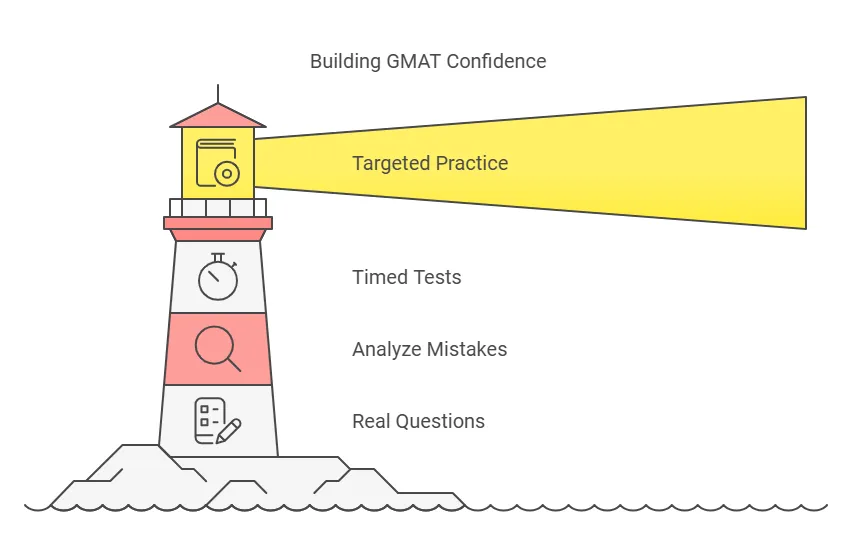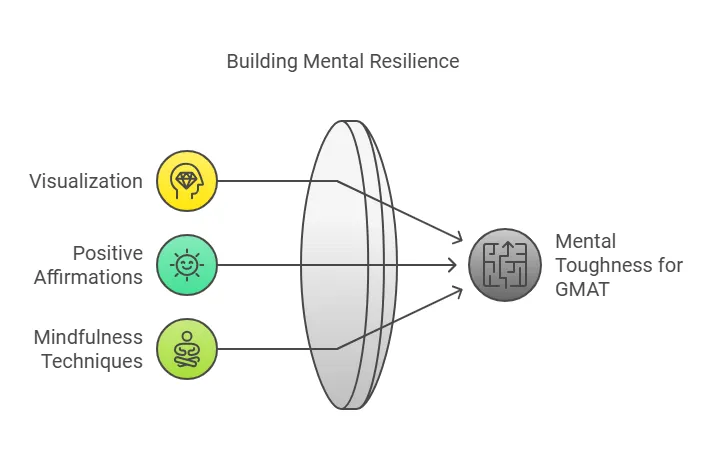Best GMAT Study Tips for Sure Success
The GMAT—a test that strikes fear into the hearts of many. But fear not, for confidence is key, and the good news is that building it is within your control. Whether you’re weeks, months, or even years away from your test day, cultivating self-assurance will give you a significant edge. With a blend of focused strategies, consistent practice, and a dash of mental fortitude, you can transform the daunting GMAT into an opportunity for triumph. Here’s how you can build confidence by following these GMAT study tips.
Why is the GMAT Important?
The Graduate Management Admission Test (GMAT) is a standardized exam used for admissions into MBA and other business-related graduate programs worldwide. Here’s why it holds significance:
| Reason | Why It Matters |
|---|---|
| 🌍 Globally Accepted | Recognized by 7,700+ business programs in 2,400+ universities across 110+ countries. |
| 📊 Assesses Core Skills | Tests quantitative, verbal, and analytical reasoning, essential for business success. |
| 🎯 Enhances Admission Chances | A high score improves acceptance at top B-schools worldwide. |
| 💼 Improves Job Prospects | Preferred by consulting, finance, and tech firms for leadership roles. |
| 🎓 Scholarship Opportunities | Many universities provide merit-based financial aid based on GMAT scores. |
Scope of GMAT
The GMAT opens doors to multiple career and academic paths:
🎯 Admissions to Top MBA & Masters Programs
- Used for MBA, Master of Finance (MFin), Master of Management (MIM), etc.
- Required by Ivy League & top-ranked business schools globally.
💼 High-Paying Career Opportunities
- Consulting firms (McKinsey, BCG, Bain), investment banks (Goldman Sachs, JP Morgan), and tech firms (Google, Amazon) value GMAT takers.
- Many firms consider GMAT scores during recruitment for leadership roles.
📈 Career Progression
- GMAT-backed MBA graduates often see higher salary hikes and faster career growth.
🌍 Global Mobility
- A GMAT-based MBA makes it easier to work in countries like USA, UK, Canada, Europe, Australia, etc.
Understand the New GMAT Inside Out
Confidence begins with clarity. The more you understand the test, the less intimidating it becomes.
| Section | Number of Questions | Time (Minutes) | Scoring Range | Key Topics Covered |
|---|---|---|---|---|
| Quantitative Reasoning | 21 | 45 | 205-805 | Problem Solving, Data Sufficiency, Arithmetic, Algebra, Geometry, Word Problems |
| Verbal Reasoning | 23 | 45 | 205-805 | Reading Comprehension, Critical Reasoning, Sentence Correction (Removed) |
| Data Insights (DI) | 20 | 45 | 205-805 | Multi-Source Reasoning, Graphics Interpretation, Table Analysis, Data Sufficiency |
| Total Score | – | 135 | 205-805 | Based on all three sections (no AWA or IR) |
Key Changes in the GMAT Focus Edition:
✅ AWA (Essay Writing) Removed
✅ Integrated Reasoning Merged into Data Insights
✅ Sentence Correction Removed from Verbal
✅ Scoring Range Changed (205-805 instead of 200-800)
Top Tips for GMAT Embrace Strategic Practice
You won’t build confidence by reading about the GMAT—you have to dive in. Regular, targeted practice is where you’ll see the most improvement. But not just any practice—smart practice.
| Tip | Details |
|---|---|
| Practice Timed Tests | Timing is crucial. Simulating real test conditions builds stamina and trains your mind to balance speed with accuracy. |
| Analyze Your Mistakes | Review incorrect answers after each practice test. Identify weaknesses and improve your thought process. |
| Practice with Real GMAT Questions | Familiarize yourself with GMAT question styles using official prep books and online resources for better preparedness. |

Build Mental Resilience
The mental game is as crucial as the academic one. Building mental toughness will enable you to approach the GMAT with the right mindset.
- Visualization: Picture yourself succeeding. You may scoff at the idea of mental imagery, but many top athletes use it, and it’s a potent tool in the academic world too. Visualizing yourself walking into the test center, sitting confidently, and tackling the questions with ease can help reduce anxiety.
- Positive Affirmations: Replacing self-doubt with self-belief can make all the difference. Say to yourself, “I am capable of acing this test,” and believe it. Positive affirmations can boost your mood and improve performance.
- Mindfulness Techniques: Breathing exercises, meditation, and stretching are simple but effective techniques to reduce stress. If you’re calm and focused, you’ll perform better.

Set Realistic Goals
Setting goals is essential, but they must be both attainable and motivating. You won’t build confidence if your targets are out of reach. The key is to break your preparation into manageable chunks.
- Create a Study Plan: A schedule is your blueprint. A goal without a plan is a dream. Structure your days, weeks, and months leading up to the test. Allocate time for each section, and leave space for review and rest.
- Focus on Milestones: Don’t just aim for a high score—set goals within each section. Maybe it’s mastering sentence correction or completing a critical reasoning section in under 3 minutes. These small wins help fuel your progress.
- Reassess Regularly: Periodically assess how you’re doing. Are you getting better at certain question types? Have you improved your timing? Regular check-ins help keep you on track and motivate you to push through.
Tackle Weaknesses Head-On
A confident GMAT test-taker is one who embraces their weaknesses. Don’t shy away from difficult topics—approach them directly.
| Tip | Details |
|---|---|
| Identify Weak Areas | Pinpoint challenging sections, such as RC passages, SC questions, grammar, or logical reasoning, and address them specifically. |
| Seek Expert Help | If challenges persist, consider a tutor or study group for new perspectives and tailored guidance. |
| Tackle One Section at a Time | Focus on improving one topic (e.g., verbal reasoning or quantitative) rather than juggling multiple areas at once. |
Stay Consistent and Motivated
There will be days when motivation seems to escape you, but consistency will always triumph over short bursts of enthusiasm.
- Consistency is Key: It’s not about how long you study, but how consistently you show up. A solid hour a day for several months will be more beneficial than cramming for a week.
- Keep Track of Your Progress: Write down your successes, even the small ones. Each chapter completed, each practice test passed, each goal achieved—they all add up. Keeping a progress log is not just motivating; it’s evidence of your growing skill.
- Reward Yourself: Celebrate milestones. Finished a practice test? Go for a walk. Beat your time in a section? Treat yourself to your favorite snack. Positive reinforcement encourages further effort.
Learn to Manage Test Anxiety
Test-day nerves are common, but learning how to manage that anxiety can transform your performance. Confidence on the GMAT isn’t just about preparation—it’s also about mindset.
- Practice Deep Breathing: On the actual exam, you can take breaks, even if they’re brief. Use these moments to close your eyes, take deep breaths, and calm your nerves.
- Control What You Can: Focus on the elements you have direct control over—your time, your answers, and your mindset. Do not dwell on what you cannot change (such as the format or difficulty of a question). Take one step at a time.
- Stay Positive: Your performance isn’t solely determined by the first few questions. If you make a mistake, move on! Confidence is in your ability to recover from mistakes.
Get Adequate Rest | GMAT Study tips
Your brain is a muscle—it needs rest. Don’t neglect sleep and relaxation.
- Sleep is Vital: Sleep improves memory retention and cognitive function. Don’t sacrifice sleep the night before the exam in the hopes of cramming; it will only hurt your performance.
- Relax the Night Before: The day before the GMAT should be for relaxation, not studying. A peaceful night’s rest will leave you refreshed and ready to conquer the exam.
Best Books for GMAT Preparation
| Book Name | Why It’s Recommended |
|---|---|
| 📘 GMAT Official Guide 2024-2025 (GMAC) | Official questions, best for authentic practice. |
| 📘 Manhattan Prep All the GMAT | Comprehensive coverage with detailed strategies. |
| 📘 Kaplan GMAT Prep Plus | Structured learning with practice tests. |
Conclusion
Building confidence for the GMAT is definitely not something you do overnight. It calls for commitment, focus, and a challenge to yourself. With each step – from strategic practice to maintaining the right mindset—you’ll be taking that much closer to success. Be persistent, believe in yourself, and keep your eye fixed on the target—the GMAT will then become only a memory, and confidence will become your greatest assistant to achieve that desired score.
Book Your Free Consultation Now




